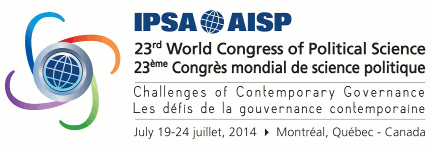This Sunday — July 20th, 2014 — I will present a paper “Probability and Possibility in Cultural Policies: Informational Regimes and the New Social Movements of Culture in Latin America” as part of the panel “Cultural Policies in Latin America: Trends and Challenges in a Time of Crisis” which will take place during the 23rd World Congress of Political Science in Montreal, Canada.
.
— Ver versión en español al final de esta sección.
.
Probability and Possibility in Cultural Policies: Informational Regimes and the New Social Movements of Culture in Latin America
By Mauricio Delfin
Sunday, July 20th, 11:00-12:45, at the Palais des Congrès (Room 525b)
The study of cultural policies in Latin America in a context of crisis should consider the tectonic tension between an ethics of probability and an ethics of possibility (Appadurai, 2013); two ways of thinking, feeling and acting simultaneously at play in the governance of arts and culture in the region. In order to illustrate this tension, this paper addresses the role of Cultural Information Systems (CIS) and of cultural networks in contemporary transnational practices of technification and contestation of cultural policies in Latin America.
CIS can be understood as technologies of government and apparatuses that configure a particular political economy of culture. On the other hand, cultural networks formed by arts and cultural organizations can be conceived as vehicles for the construction of futurity and meaning structures that engineer new social relations in a context of crisis. Focusing on the experience of the national CIS in Peru, this paper explores how these infrastructures establish epistemological and valuation regimes that configure productive and extractive processes.
Additionally, it takes the “Cultura Viva Comunitaria” (Living Community Culture) transnational movement as a case study to show how cultural networks serve as critical devices to navigate and advance through contexts of institutional and economic uncertainty. The paper argues that cultural networks, facilitated by information and communication technologies, signal an emerging politics of relationality among arts and cultural organizations. Understood in conjunction with CIS, they provide insights into an underlying tension that directly affects policymaking in the cultural sectors of the region today.
* * * * *
Probabilidad y Posibilidad en las Políticas Culturales: Regímenes informacionales y los nuevos movimientos de cultura en América Latina
De Mauricio Delfin
El estudio de las políticas culturales en América Latina en un contexto de crisis debería de considerar la tensión tectónica entre una ética de la probabilidad y una ética de la posibilidad (Appadurai, 2013); dos formas de pensar, sentir y actuar que están simultáneamente en juego en el gobierno de las artes y la cultura en la región. Para ilustrar esta tensión este artículo aborda el rol de los Sistemas de Información Cultural (SIC) y de las redes culturales en prácticas transnacionales contemporáneas de tecnificación e impugnación de las políticas culturales en América Latina.
Los SIC pueden ser entendidos como tecnologías de gobierno y aparatos que configuran una economía política de la cultura. Por otro lado, las redes culturales formadas por organizaciones culturales pueden ser concebidas como vehículos para la construcción de futuros y estructuras de significado que reconfiguran relaciones sociales en un contexto de crisis. A partir de la experiencia de los SIC en el Perú, este ensayo explora como estas infraestructuras establecen regímenes epistemológicos y de valuación que a su vez configuran procesos productivos y extractivos.
Adicionalmente, toma a la el caso del movimiento transnacional conocido como “Cultura Viva Comunitaria” para mostrar como las redes culturales sirven como dispositivos críticos para navegar y avanzar a través de contextos de incertidumbre institucional y económica. El ensayo sostiene que las redes culturales, apoyadas en tecnologías de información y comunicación, dan cuenta de una política de relacionamiento emergente entre organizaciones culturales. Entendidas en relación a los SIC, estas redes nos proveen de perspectivas respecto a una tensión subyacente que afecta directamente el diseño de políticas en los sectores culturales de la región hoy en día.
